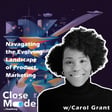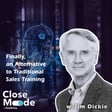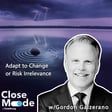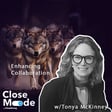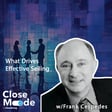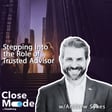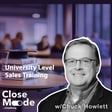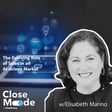Intro
Introduction and Guest Introduction
00:00:05
Brian
Hello, welcome to another edition of close mode, the enterprise sales show. I'm Brian deep Meyer, CEO of close strong. And today I, and we are lucky to be here with Liz Hyman. Liz is the CEO and chief strategist for regarding sales. And for those of you who are not familiar with it.
00:00:22
Brian
ah ah Regarding sales helps founder founders create strategy clear strategy implement I love this a knowable doable B2B sales operating system to achieve predictable sales revenue ah Liz lizz also runs the sales SOS podcast as as I recall and You may or may not have spent some time in a company with the name Miller Hyman as I recall
00:00:50
Brian
I thought you did. so well Welcome to the show.
00:00:54
Liz Heiman
Thank you. I'm glad to be here.
Challenges in Sales Leadership
00:00:57
Brian
so we had We had a chat last week and and we started talking about sales operating systems. and you You just said a bunch of stuff that made me want to dig into it some more. and and and you know the The thing you said that was pretty powerful is a lot of leaders really don't understand how to run a sales organization. And, and, uh, you know, I started thinking of that, that there's probably some truth to that. And then, you know, the question is why so, but my first question is you talked about, you know, not, not knowing how to run a sales organization is not having ah a really strong sales operating system. I think intuitively. We all kind of get what that is, but, but I'd like to hear Liz's version of the kind of major elements of an effective sales operating system.
Components of a Sales Operating System
00:01:41
Liz Heiman
Sure. Before I start, I just want to say, how would you even learn how to run a sales organization? right so There's this whole process missing of of teaching people how to do this.
00:01:54
Brian
No, and and but but by the way, Lance, I just want to stay on that for a second because as I was saying that, that's kind of what came to mind that one of the root causes is maybe the the way we come up, right? the the best The best salespeople get the leader's jobs. And and i i people on the podcast often hear me refer to Bill Marriott because I worked for Marriott for a bunch of years. And And he had a saying, uh, many of them, but one was, you know, that the very things that made you successful are the things that will lead to your failure in your next position.
00:02:24
Brian
And all that comes to mind when you say that. So I do think that's important.
00:02:28
Liz Heiman
Well, and if you think about the head of a company is always the head of sales.
00:02:32
Liz Heiman
No matter how far they think they're removed from sales, they're always the head of sales and very few heads of companies come out of sales.
00:02:41
Liz Heiman
So how would you even know these things, right?
00:02:44
Liz Heiman
So let's talk about a sales operating system. What is it? Why do you need one?
00:02:49
Liz Heiman
So when I think about a sales operating system, there are really three critical parts. The first is that you have a strategy There's a strategy that says, here's where we're going as a company. Here's what the sales team needs to support it. You have a lead generation strategy. You have a sales strategy. You know you have this these strategies that are going to guide activity. and And one of my favorite ways to think about it is to say, activity without strategy is chaos.
00:03:23
Liz Heiman
So a lot of people want to start with tactics and activity, but what you really want is activity that supports the goals that you have. So that's the first thing is getting all those strategies in place. The second thing is really setting the systems and the processes in place.
00:03:38
Liz Heiman
What is the process that people have to go through in order to purchase from us?
00:03:41
Liz Heiman
What is the buyer journey? What is the seller journey? How did those two connect?
Aligning Sales Processes and Management Styles
00:03:47
Liz Heiman
Does our sales process support the buyer journey in a way that makes it easy for them to buy?
00:03:52
Liz Heiman
And what are the activities? What are the questions? What are the collateral or tools that are needed at each each stage of that strategy to be successful? And and the next question is, how does that align with your CRM?
00:04:04
Liz Heiman
Or more importantly, how does your CRM align with what your sales process is. And then I think the third component is management. we We sort of manage by reaction. We spend a lot of time putting up fires, reacting to whatever's going on and proactive selling, proactive leadership are sort of missing. And so do you have the agendas and the critical pieces that are required?
00:04:35
Liz Heiman
to manage and support your sales organization. Those are the three critical pieces for me.
00:04:40
Brian
You know, you you said a couple of things that, by the way, I love activity without a strategy is chaos. Like that, that's the great thing about sayings like that, right? Like yeah the one I mentioned from Bill Merritt, because the they they tend to sum up stuff really quickly. And it occurred to me while you were saying that, that we're so action driven in sales that sometimes it's, yeah, it's like, yeah, stop thinking about stuff and go do stuff. And sure, but we might want to think about stuff a little bit upfront.
00:05:08
Brian
Yeah, the other thing you mentioned was the kind of buyer-seller journey coming together in years ago in business school. And you may be familiar with it. There's an old HBR article called Staple Yourself to an Order. And and the the argument is that any CEO, to the point you made earlier about them maybe not coming up in sales, staple yourself to an order and and find out what it's really like, which you know I think would be brilliant. You just brought that article back to mind.
00:05:34
Brian
So you know my next question had to do about ah you know why is there a ah ah lack of strong general management? I think we we started with that one, which is how people come up and how they get promoted and and what brings them into the um and Anything you want to add sort of in terms of root causes beyond simply their career pathing?
00:05:56
Liz Heiman
I think, yeah, career path is important, but I think there's also this, there's a couple of things to have. i I have been in a sales organization, so I have experienced what somebody else did in leadership, but they weren't necessarily a good leader.
00:06:13
Liz Heiman
So I'm going to build my model of leadership either on what someone else did or based it on not doing what somebody else did. But neither of those are strategies that say, here's what I want to accomplish with my team. What is the best way to get my team to achieve those things? So from the very top and from the investors, we get pounded on numbers, numbers, numbers, closes, closes, closes. We don't really get the freedom to focus on the entire funnel, the entire salesperson, like the salesperson, not just what they're closing this week, but what is their journey?
00:06:53
Liz Heiman
What are their missing skills? What are their strengths? How do we leverage those?
Short-term vs Long-term Success in Sales
00:06:58
Liz Heiman
So we're missing all of these pieces because we focus on what's closing right now, what's closing this week, what's closing this quarter, are we going to hit our numbers, hit our numbers, hit our numbers.
00:07:08
Liz Heiman
If you are always focused on how you're going to hit your numbers right now, you're never focused on what it will take to hit your numbers next year.
00:07:16
Brian
Yeah, yeah, yeah. yeah
00:07:17
Liz Heiman
And I think that's one of the biggest gaps is we don't learn how to manage the entire sales process and to support the salesperson to achieve what they need to achieve.
00:07:27
Liz Heiman
We just pound numbers until we have beaten our salespeople to death and they don't like it anymore and they don't want to work for us anymore.
00:07:33
Brian
yeah Yeah. Yeah. And it's, again, you keep saying things, that like which is fun, by the way. It makes me think of more things, you know, we go back to this like lack of general management skills. And I, i by the way, anyone younger than me is 12. So I i was, paid they might be 30, but they're 12 in my mind. So I was 12 when I was handed a VP of national account sales job at Marriott.
00:08:00
Brian
And, and I think maybe I, I went through some leadership skills, but it was more the soft leadership skills training. Like what, what just occurred to me as you were talking through that, and I'm sure I'm prototypical for people.
00:08:11
Brian
I got in there because I was a rockstar sales guy. and, but no general management skills and every, and yeah, I feel like there's, and I'm sure there's curricula out there somewhere, but that's, that's one thing that occurs to me is that, you know, you.
00:08:27
Brian
we're just not prepping people in this way for everything you've talked about for a sales operating system we're not prepping them if they don't walk in with that bias.
00:08:36
Liz Heiman
and we And we tend to think also in smaller companies, we're going to hire a sales leader who comes out of a big company that has great experience.
00:08:44
Liz Heiman
you know They come out of Google or HP or you know whatever, and we we get them there and we think they're going to know what to do. They're going to know how to build and grow this sales organization that's very immature, but in fact, they're used to running sales organizations that are very mature.
00:09:00
Liz Heiman
And that they're totally different.
00:09:01
Liz Heiman
So how mature is your sales organization and what is your experience with maturity level in the the organization you've been in? And there's a huge mismatch.
00:09:13
Liz Heiman
If I'm running a startup or a really fast growing mid-sized company, and I'm hiring people that come from very mature sales organizations with all the bells and whistles, they don't have the skillset to do what I need them
Roles of Company Leadership and Sales Leaders
00:09:29
Brian
yeah so i I wonder, and and we we you and I talked about this a little bit as we were prepping for this, like who Excuse me who's who should own the sales operating system and I was asking you about you know revops I mean this is a cross-functional strategy it sounds like so revops jumped out to me is is it the CSO is it the sales VP or is it a gray or answer to that who's who's ultimately responsible.
00:09:57
Liz Heiman
Well, I'm going to back up and say the very first thing is that if you expect your sales leader or your sales ops people to hit your goals when you do not have a clear business strategy, then you're a fool.
00:10:11
Liz Heiman
Sorry, it's not going to happen.
00:10:12
Liz Heiman
So we think just throw a number at my sales leader and they'll throw a number at their sales people and this will somehow result in what we need. Well, it might result in the numbers that you need, but it might not result
00:10:25
Liz Heiman
in the verticals, the products, whatever it is that you really need to achieve for the company to go the direction you want it to go.
00:10:34
Liz Heiman
So the first thing is that leadership takes leader company leadership is the first place.
00:10:39
Liz Heiman
And the buck stops there, essentially. Then second is you know it's it's sales ops, RevOps responsibility to figure out what systems need to be in place in order to support a strategy.
00:10:54
Liz Heiman
so The sales leader is responsible for the sales strategy. So that this is a marriage between the two, but but it is the sales leader's job to make sure we're hitting goals.
00:11:06
Liz Heiman
It's a sales leader's job to make sure the salespeople are successful.
00:11:10
Liz Heiman
And RevOps comes in to support the strategy with the systems and processes that we need.
00:11:15
Brian
Okay. So how, kind of ah another another pop-up question that just came to mind. If someone's in a, in a leadership role and, and you're hearing this going, okay, wait, maybe maybe i I've got some gaps. I mean, what one way to fill that gap is to hire a consultant, and one of us to come in and help build these things. That's
Resources for Building Sales Skills
00:11:34
Brian
for sure. But are are there any sort of, uh, self-help tools? If some, someone's hearing this, like what what can they do to beef up their sales operating system, their strategic chops?
00:11:45
Liz Heiman
I think there's so many really good books out there that you can read.
00:11:50
Liz Heiman
you know i And I think one of the first ones is not a sales book. It's The E-Myth Revisited to get you really start getting you to start thinking about what is process?
00:12:00
Liz Heiman
What is process?
00:12:01
Liz Heiman
What is systems? How do we define all of this? It's a great book to start with.
00:12:05
Brian
And can you say that again, the emith you said?
00:12:07
Liz Heiman
The E-Myth Revisited.
00:12:10
Liz Heiman
And I know the author's name, but it has just slipped out of my brain.
00:12:13
Liz Heiman
But it's a really good starting point. And then if you want to look at what are all of the things that people are writing about sales? What you know what is Seth Godin writing? What is Jeb Blunt writing?
00:12:26
Liz Heiman
I could name a dozen other people who are writing books talking about sales and the different components of sales that you need to have in place to be successful.
00:12:39
Liz Heiman
you know The other thing is to listen to how other people did it. So i'm goingnna I'm going to promote my sister here for a second. So Alice Hyman, who is my sister, has a great podcast where she talks to sales leaders about how they built their organizations and what mistakes they made and what went wrong.
00:12:56
Liz Heiman
So most podcasters are talking to company leaders about this, but Alice is talking to them really about sales. So looking for places like that where you can start to learn how it works.
00:13:06
Brian
Yep. No, I, and I think, I think that's a, that's a brilliant intro too. And you write books. I think Alice's podcast is, is a great idea. Cause I'm trying to find ways again for those of us sitting here going, Oh crap, I might have some of these gaps. You know, what, what can I do like tomorrow? Like if, if you, you hear this, so what would you, I'm i'm a big fan of, of kind of diagnostics, uh, like diagnosing before we prescribe it's been in my DNA forever and as a seller, but.
00:13:36
Brian
Yeah. How, how would you diagnose issues with your sales operating
Diagnosing Issues in Sales Systems
00:13:41
Brian
system? Like what's, what's the low hanging fruit? Again, if someone's listening, uh, slash watching and wondering, Hmm, how do I know if mine's broken? where Where would you go first, second, third?
00:13:51
Liz Heiman
So the first is looking at the fires that you're putting out. So if you talk to most sales leaders, they will tell you and sales managers, they will tell you they spend the majority of their day putting out fires.
00:14:02
Liz Heiman
Well, if you're spending your day putting out fires, every time you put out a fire, instead of looking at the salesperson and getting angry because they didn't do what you wanted them to do, look at the process that enabled them to make that mistake.
00:14:16
Liz Heiman
how How are your processes supporting them to success? you Stop blaming and start looking for what do we need to do? Now, if you have a salesperson that regardless of the rules and regardless of what you set up, they keep messing up, then there might be a problem with that salesperson. But my guess is you're finding the same kinds of problems happening across all your salespeople, which means there's a gap in your sales process and support. The second thing is to look at your CRM, look at your sales funnel. What do you see when you look at it? Is there consistency or is there inconsistency? Does everybody have a different definition for every word, you know for every stage? does your so Do your stages represent what the buyers are going through? Are you having consistent velocity? Does it take the same amount of time for most sales to go through the funnel for
00:15:05
Liz Heiman
All of your sellers and all of your industries, are they different? Are things getting stuck in certain places? Is there a lot of junk in there that people are afraid to throw away because there's no leads coming in? like Those are the two places I would start.
00:15:18
Brian
OK. And how how about ah ah metrics that that are moving, that that are like the lagging indicators that something upstream is is busted?
00:15:29
Liz Heiman
so I think we first have to back up and figure out what what are we measuring? And most most companies, when I go in and look at the KPIs, they don't necessarily measure what matters.
00:15:41
Liz Heiman
So if you're setting up KPIs or whatever term you want to use today for those success measures,
00:15:47
Liz Heiman
I would start with the funnel. If I understand the math of the company, and I'm sorry, some people will tell you, there is no sales math, just sell better and everything will be fine.
00:15:58
Liz Heiman
That's a nice idea. I wish it were true, but to date, I have not met a company that doesn't have some sort of loss through the process, right?
00:16:08
Liz Heiman
So the first people you talk to, you maybe talk to 10 people and one of those actually closes.
00:16:15
Liz Heiman
So if you're prospecting, you know What is the math from prospecting to close? If you begin to understand that, and if you begin to watch the velocity, now you can set KPIs and say, are ah ah do you have enough leads in the various stages of the funnel in order to order to hit your goal in six months? If you have a six-month sales cycle, or nine months, or 12 months, or whatever that is. The second is velocity. Is everything getting stuck in your funnel? Is there a bunch of stuff?
00:16:46
Liz Heiman
stock and qualify that is never going to turn into business that you're not throwing away. So when you're setting your KPIs, look at what does the sales math look like? What does the process look like? And how do I measure progress along the way in order to identify problems early on?
00:17:05
Brian
Yeah, it's really it's really
Tech Stack Complexity and AI in Sales
00:17:06
Brian
interesting. I'm really lucky to have talked to a bunch of CROs and a bunch of RevOps folks, and I just heard a CRO say the other day, velocity. That's that's my my number one my number one thing. and But ah ah the other thing that I keep hearing too is the sort of crazy speed of change with technology. And it occurs to me, and this has come up to me a couple of times as you've been talking,
00:17:29
Brian
that managing a really good sales operating system is a very, very, very complex tech stack. and and i And I feel like we haven't talked about that yet. that isn't that Like you talked a little bit about CRM, but I feel like figuring that out, underdoing or overdoing that it can can hurt or help a system to get it just right.
00:17:50
Liz Heiman
I think a lot of companies are overdoing it. That's the first thing.
00:17:54
Liz Heiman
If your salesperson has to go to six different tools in order to do their job, it's time to think about how to make that easier. If you want your salespeople to use the CRM, keep them in the CRM.
00:18:07
Liz Heiman
And then any tool that they use should be aligned with their CRM so that they can easily work in there.
00:18:13
Liz Heiman
I think that's one of the first things. i think I think the second thing is that this tech stack is going to change faster now than it has.
00:18:22
Liz Heiman
It's been changing so fast, but now with the introduction of AI and what really works and what really doesn't.
00:18:28
Liz Heiman
I mean, it's really, really important to understand that AI only uses the data that exists to create suggestions or emails or whatever it is that you want that to create.
00:18:40
Liz Heiman
If your data pool isn't good, then the outcomes are not going to be good. and if the
00:18:45
Liz Heiman
that sells people aren't using the CRM properly, then the data pool is is a mess. So you know you think AI is the magical message, you know the magical thing that's going to solve all your problems.
00:18:59
Liz Heiman
There's no magical thing. There's never been a magical thing. There will never be a magical thing. It's a tool that will help you if it's based on data that's accurate.
00:19:09
Brian
yeah Yeah, it's it's interesting. two Two reactions to that. As as a CEO of a of ah sales tech startup, i know I see the same thing and and I tend to think of it as is point products. And we start mapping out like what our customers, there's all these little pieces and in and of themselves. They're kind of cool. And I feel like that's wow that's what's come into the market, you know whether it's forecasting stuff or or You know content generation or whatever it is it's all these little bits and pieces and i feel like that's part of the problem is the lack of holistic solutions.
00:19:42
Brian
And it's it's interesting too because I one of my partners sent me an article from Gartner the other day and because we were having this discussion with our CTO about when is AI AI and and we were talking we were talking to an investor and and we have a and our solution in the investors like well how long before your thing has efficacy, you know, it's gonna take you a year to train the LLM so I went back to our CTO and was like
00:20:07
Brian
Wait, it's a really gray area. are Are we AI? And he's like, well, we're building something that kind of doesn't exist that I haven't built before. And it's modern software sprinkled with AI. And lo and behold, about two weeks later, one of my partners, Patrick stumbled on a Gartner article. I think this is helpful for people. um I've been sharing it as much as I can. Gartner calls what we're building. We didn't know we were building an intelligent application.
00:20:31
Brian
and and And their argument, forget anything I'm doing, you can go to Gartner's article on, it I think it's called like demand growing for intelligent apps. And intelligent apps are modern software that have AI sprinkled in them to make them super smart at different pieces. And the efficacy is earlier. And like I said, I've been sharing this as much as possible because I think for those of us dealing with issues you just talked about.
00:20:57
Brian
that, that it's, it's neither just software or AI, but it seems to be now this, this matrix, uh, of the two. So yeah, I just want, if, if you haven't, if you haven't heard of it, uh, Liz yourself, yeah, I would take a look cause it's, it's pretty cool emerging kind of emerging tech or blending of, of a couple of texts.
00:21:18
Brian
so. Yeah, this, this is, uh, really helpful and I especially like. the The indicators of, because that, that came to me right away, the indicators of what's broken. Cause I've heard people saying those, right? The same problem over and over again or velocity or whatever it is that it's like, okay, something, the systemic problem.
00:21:37
Brian
Right. You're looking at this tactical issue and it's more systemic and that'll tell you your operating system is broken. I love the idea of how to get yourself skilled up to run a better one. this is kind of an aside, but in our pre-interview, this is going to back to those like things people say that are quippy that makes sense. And so this is, we're going to jump down into tactics of selling right now. You said something to me.
00:22:00
Brian
Because one of my questions was, you know what frustrates you in selling today in general? and And you said, my guy said. and and it And it struck me, I feel like it was one of those things, once again, you know like the the chaos thing you said earlier, that it's like, that's really meaningful.
00:22:18
Brian
So talk to me about my guy said,
Avoiding Reliance on Single Points of Contact
00:22:20
Brian
why is that a problem?
00:22:20
Liz Heiman
Well, the first thing is understand that we Gardner says that the number of people involved in a sale has gone from five to 15 or whatever it is whatever the newest number is.
00:22:32
Liz Heiman
So if there are 15 people involved in a buying decision, If it's a complex business-to-business sale that's going to take several months and change impact the company, make changes in the company that you're selling to, there's more than one person involved.
00:22:46
Liz Heiman
But what happens is our marketing team directs the marketing toward a person who goes on the website and does the research, and then we hand that person to the salesperson. And that person is the is the person who's supposed to be going out and doing the research and picking some vendors and making some recommendations.
00:23:04
Liz Heiman
of in many cases, no authority to make a decision. But the salesperson is not given permission by that person to talk to anybody else.
00:23:14
Liz Heiman
Or that person convinces them they've got everything under control. All they have to do is talk to them. And and my guy at this company is going to direct me through this sales process.
00:23:29
Liz Heiman
So why is that a problem? Well, it's a problem because this person usually has very little authority. It's a problem because this person does not know what everybody else is thinking.
00:23:40
Liz Heiman
It's a problem because there are other people, other sales people who are accessing people higher in the organization like the VP or the CEO or the person who can make or break the sale.
00:23:52
Liz Heiman
And so you're sitting back and waiting for your guy to bring it up to the CEO. My guy said, they're going to talk about it on Thursday. My guy said, he told me after they have the meeting, my guy said the CEO really likes it.
00:24:05
Liz Heiman
My guy said, we're probably going to win this deal. And I don't know how many deals have been lost because my guy was wrong.
00:24:12
Liz Heiman
And so whenever I am working with a salesperson and they just just keep giving me the same person's name, I always ask them, and who else have you spoken with?
00:24:21
Brian
Yeah. Yep. Yeah. And in it's single threading, right? And and we all know it's a problem. We all know that no decisions on the rise because our customers are struggling with the complexity of their decision process given committee buys and all that stuff. And the single threading is still an issue. I can.
00:24:38
Brian
yeah Quite frankly think to a couple of our deals. Well, we weren't threaded enough and
Conclusion and Visualizing a Strong Sales System
00:24:43
Brian
you know the the my guy so it just yeah we should banish my guy said From from as opposed to by the way, I have a friend of mine who's a software engineer who's starting like a home improvement fix it ah Fix it company and his tagline is I got a guy now that's different
00:25:01
Brian
For my buddy Jeff, I got a guy. Yeah, your plumbing's broken. I got a guy. I can fix that for you. So this has been really fun. it was It was fun to prep for this and it was fun to deliver it. it's ah ah It's a really important distinction, I think, at the highest level about how we're preparing folks for for the sales leadership roles, especially with the complexity of the tech stack out there and running a sales operating system. so Yeah, you've been really, really, really generous with your time and your ideas and it's completely appreciated. and And speaking of that, like there's part of me that wants a visual of, of a strong sales operating system. And I'm certain you have one of those. So if you would, if, if, if you send that to me, then I'll put it in the link once we start pushing out, because that's, I personally want to see, like I get it, but I want to see the image of that. So again, thank you so much. This has been a blast and I look forward to getting it out to folks.
00:25:55
Liz Heiman
All right. Well, thank you so much for having me. It's been great talking with you.
Outro

